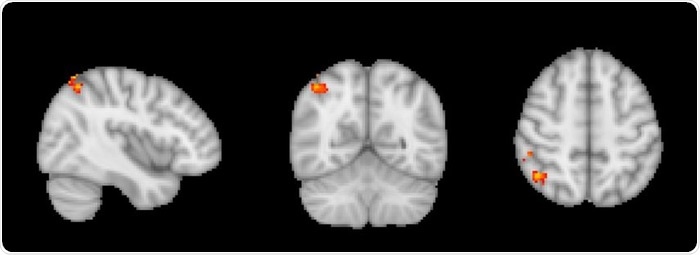
Illustration: fMRI brain scans, showing the increased brain activity in the right angular gyrus in the prucalopride group versus the placebo group. Image Credit: Angharad De Cates. This illustration is licensed under Creative Commons Attribution 4.0 International License. See Creative Commons license for more information.
Severe psychiatric disorders have serious implications on a patient’s life. Cognitive impairments—ranging from reduced attention and working memory to interrupted social cognition and language—are prevalent in psychiatric disorders like schizophrenia, major depression, and bipolar disorder.
These familiar problems are badly treated with medications available at present and mostly have a major influence on individuals’ lives. Hence researchers are always looking out for means to improve or restore these functions.
Earlier animal studies revealed that the drugs targeting one of the serotonin receptors (the 5-HT4 receptor) exhibits promise in enhancing cognitive function (serotonin, a neurotransmitter is identified by SSRI antidepressants).
But there are concerns about translating these animal findings into humans owing to their side effects. Recently, a team of UK scientists analyzed a prevailing, approved drug—prucalopride—which identifies the 5-HT4 receptor, and identified that it might enhance cognition. Prucalopride is mainly prescribed for constipation and has a justifiable level of side effects when taken under medical supervision.
The research trial involved 44 healthy volunteers who were aged between 18–36 years. Out of them, 23 individuals were given prucalopride, and 21 were given a placebo. All volunteers underwent an fMRI brain scan after 6 days. The volunteers were exposed to a series of images of animals and landscapes prior to entering the MRI scanner.
They were shown the same images along with similar images at the time of the scan. Following the scan, volunteers completed a memory test where they had to differentiate the images they viewed before and at the time of the scan from a set of completely new images.
Lead researcher Dr. Angharad de Cates of the University of Oxford presented the study at the European College of Neuropsychopharmacology conference in Lisbon (followed by publication).
Participants who had taken prucalopride for 6 days performed much better than those receiving placebo on the memory test; the prucalopride group identified 81% of previously viewed images versus 76% in the placebo group. Statistical tests indicate that this was a fairly large effect—such an obvious cognitive improvement with the drug was a surprise to us.”
Dr Angharad de Cates, Lead Researcher, University of Oxford
The scientists identified that when compared to volunteers taking the placebo, the volunteers taking prucalopride were both refined at the memory following the scan. Their fMRI scans indicated improved activity in brain areas concerning cognition. The higher activity in the areas was linked with memory, like the hippocampus (in the center of the brain) and the right angular gyrus (found towards the back of the brain).
Even when the low mood associated with depression is well treated with conventional antidepressants, many patients continue to experience problems with their memory. Our study provides exciting early evidence in humans of a new approach that might be a helpful way to treat these residual cognitive symptoms.”
Dr Susannah Murphy, Study Senior Author and Senior Research Fellow, University of Oxford
Angharad de Cates added, “This is a proof-of-concept study, and so a starting point for further investigation. We are currently planning and undertaking further studies looking at prucalopride and other 5HT4 agonists in patient and clinically vulnerable populations, to see if our findings in healthy volunteers can be replicated and have clinical importance”.
Prucalopride, a 5-HT4 agonist, is mostly taken for constipation and does not have many side effects when taken under medical guidance. However, medical practitioners do warn of the possibility of gastrointestinal symptoms like abdominal pain, headache, fatigue or dizziness, and nausea and diarrhea. In this study, none of the volunteers exhibited significant side effects while taking prucalopride.
This study highlights a very interesting and much needed potential for repurposing drugs to help cognitive dysfunction, which is often associated with psychiatric disorders even in remitted states. Importantly, as the authors also state, it will be vital to translate these findings from healthy populations into clinical populations. It will also be important to understand if prucalopride adds to the effects of existing antidepressant treatments, or can be used as a stand-alone therapy”.
Dr Vibe Frokjaer, Adjunct Professor, Department of Psychology, Copenhagen University